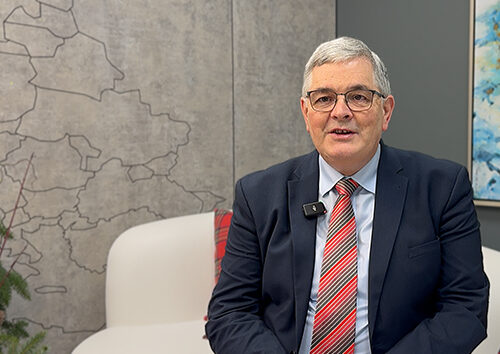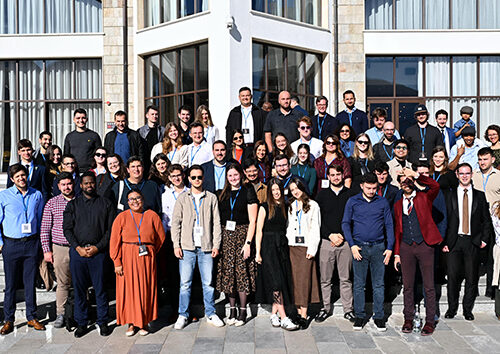28 May 2012 St. Albans, United Kingdom [Miroslav Pujic, tedNEWS] Forty-three delegates from the eleven Unions and three attached Fields, which constitute the Seventh-day Adventist Church in the Trans-European region, (TED), including TED administrators and departmental directors, met at Newbold College, United Kingdom from 10 – 12 May 2012. The purpose of the meetings was to engage decision making leaders and practitioners from the forefront of missionary work in a constructive dialogue and help them in reaching common goals. This Consultation on Mission was inspired by the theme accepted by the TED Executive Committee: ‘Revived by His Word: think differently … think possibilities.’
‘One of the main reasons for calling this meeting was to create an “incubator” for new approaches to mission, especially church planting, across the division’ said Pastor Janos Kovacs-Biro, TED Evangelism Director, who organised the meetings. He added, that together we want ‘to create a platform for an exchange of ideas, approaches and methods, and to develop models of outreach which will appropriately respond to the socio-cultural changes in Europe.’
 In his opening speech Dr Bertil Wiklander, President of the Trans-European Division, said that ‘being a Seventh-day Adventist is fundamentally a matter of longing for God, and this longing finds its fulfillment in the vision of Revelation 21:1-5’. The little church family established in May 1863, was able to grow and spread itself to all countries in the world because they began to think differently and discover new possibilities.’
In his opening speech Dr Bertil Wiklander, President of the Trans-European Division, said that ‘being a Seventh-day Adventist is fundamentally a matter of longing for God, and this longing finds its fulfillment in the vision of Revelation 21:1-5’. The little church family established in May 1863, was able to grow and spread itself to all countries in the world because they began to think differently and discover new possibilities.’
Dr Wiklander recognised the challenges that we face as a church today in Europe, and he listed 16 major issues which need to be addressed. Here we will list a few of them:
1. The Church misunderstands different cultures – those who don’t look like us and don’t talk and ‘smell’ like us – they are seen as an enemy of the church.
2. The Church is apathetic – skepticism and no success in the past
3. The Church is puzzled – why the attrition? Are people just not interested in faith anymore?
4. The Church is frustrated – why do members keep leaving?
5. The Church is concerned about the ‘front door’, but leaves the ‘back door’ open wide.
6. The Church is a boring place.
7. Churchless spirituality – ‘we do not need to go to church but can say at home or go out in nature to pray.’
8. The Church likes to keep one format forever – people are more adventurous and like to move in the way the spirit leads them.
 Wiklander pointed to neglected truths in the Word of God that may empower the church for God’s mission. His final appeal was: ‘Be renewed by his Word! Think differently and think possibilities! If we believe that “for God all things are possible” we can be optimists because he is on our side! Then our eyes will be opened and we will see the opportunities for God’s mission in Europe today! This is the task God is giving us now!’
Wiklander pointed to neglected truths in the Word of God that may empower the church for God’s mission. His final appeal was: ‘Be renewed by his Word! Think differently and think possibilities! If we believe that “for God all things are possible” we can be optimists because he is on our side! Then our eyes will be opened and we will see the opportunities for God’s mission in Europe today! This is the task God is giving us now!’
Dr Daniel Duda, TED Education Director, led the participants into the study of the ecclesiastical role of the church and showed how Jesus’ cultural sensitivity was more successful in bringing people to an understanding of the Kingdom.
Dr Miroslav Pujic, TED Ministry to Postmoderns Director, made a presentation on the socio-cultural changes that took place in Europe 30 years ago which made a major paradigm shift in the way people think and ‘do’ life. ‘The Adventist church failed to grasp that living in a new culture really makes a difference in the way people think and approach life. Church membership and attendance is shrinking and new-comers are fewer. We need to do something. Business as usual is not going to help us,’ said Pujic.
All the participants had an opportunity to share their opinions, suggestions and strategising through the discussions in small groups led by Pastor Raafat Kamal, TED Adventist Mission Director.
A number of practitioners from the UK and abroad shared with the group some evangelistic models and case studies that are working very well in a new postmodern environment. The participants also had a chance to identify resources and models that can be replicated in their respective countries.
This was a consultation where thinking out of the box, fair analysis and strategising were involved, together with some professional presentations. Another novel aspect was that leaders and practitioners sat at the same table and spoke the same language of mission. A study of some of the effective outreach models currently being used within the TED gave a new flavour of inspiration to the Consultation on Mission. The whole consultation was embedded in prayer and worship.
 ‘God has a Mission and He called His People to be His representatives in Europe, which is God’s Mission Territory’ commented Kovacs-Biro. He continued, ‘It is time to change from a talking Church into a “representing God” Church, where meeting people’s needs and making God’s message relevant, are the key activities of the Church.’
‘God has a Mission and He called His People to be His representatives in Europe, which is God’s Mission Territory’ commented Kovacs-Biro. He continued, ‘It is time to change from a talking Church into a “representing God” Church, where meeting people’s needs and making God’s message relevant, are the key activities of the Church.’
‘As someone at the grassroots level, I am excited by how seriously the leadership of our church is taking the challenge of mission to the indigenous majority population. Success will not be achieved over night so we need much prayer, patience and support from our leadership,’ commented Rosemary Lethbridge, Church Planner in the UK.
Pastor Zmago Godina, President of the Adventist Church in Slovenia, was very thankful for the consultation. ‘The consultation was, for me, a valuable learning experience, in that I was challenged to think “outside the box” when it comes to the mission of the church. At the same time it was also a deep spiritual experience and a renewal of my commitment to God and his work.’
‘How should we react to the challenge of secularism and postmodernism? How should we respond to the great gulf between God’s ideal and the messy reality of this age?’ asked Pastor Arne-Kristian Andersen from Norway. He continued, ‘sometimes it seems that our response has been to isolate ourselves in order to preserve our own holiness. I am left with the thought that these circumstances force us to go back to basics: a loving, Spirit-filled Church meeting the needs of the community and calling them to follow Christ. It’s time to follow our Rabbi out of isolation and into the great adventure that awaits.’
 In his concluding remarks, Dr Wiklander said that we are a church in the business of change. If everything could remain the same, there would be no need for mission! But our mission is ‘change’, therefore we as a church must change what needs to be changed in us. Why do we need to change? We need to change so that we multiply people who have faith.
In his concluding remarks, Dr Wiklander said that we are a church in the business of change. If everything could remain the same, there would be no need for mission! But our mission is ‘change’, therefore we as a church must change what needs to be changed in us. Why do we need to change? We need to change so that we multiply people who have faith.
‘As a large organisation, the church sometimes must divide the work into various sectors, but if those sectors don’t interact, we are in trouble. In this gathering, church leaders have interacted with evangelists and church planters. We understand each other better now. Since the world has changed in how it thinks and communicates, we have to understand them better. Change may affect how we give reasons for why faith in him is the best way to approach life, but it may also impact our worship style and how we grow into warm Christian communities,’ said Dr Wiklander.
The group has accepted the declaration of commitment for their future work. See below for your information. [tedNEWS]
COMMITMENTS
Reach Up
1. We commit to being biblically grounded and intentionally prayerful in making God known, felt and heard among competing voices in Europe.
2. We commit to living an authentic Christian life by discovering and using the God-given gifts and personal evangelism styles in being agents of change to family, friends, neighbours and society.
Reach Out
3. We commit to intentionally re-thinking and changing our approach to communities to become more relationally orientated through consciously participating in all dimensions of life and its challenges.
4. We commit to inspiring leaders, pastors and believers to serve the real and felt needs of the whole community, not just of the local churches.
5. We commit to creating alternative worship spaces where everyone is fully respected in love and fellowship.
6. We commit to intentionally building inclusive, just and merciful communities that foster reconciliation, healing and the fullness of life in Christ.
7. We commit to learning and developing fresh ways to communicate the biblical message through experiential means such as stories, metaphors, drama, art, music and life experiences that present the Gospel in a simple, understandable and relevant way.
8. We commit to training our children and young people in discipleship and community engagement, so that they may reach their generation for Christ.
9. We commit to modeling and engaging in the arenas of public life, civic authorities, business and academia as they shape societal values and have a strong influence on public debate that can impact the existence and operation of our Adventist communities and the Christian community at large.
10. We commit to engaging and supporting immigrant Adventist groups in their ministries to reach their ethnic groups, international students as well as the majority ethnic population.
Reach Across
11. We commit to defining, modeling and creating a positive perception of what it means to be an engaged community of believers with a clear and strong Seventh-day Adventist identity.
12. We commit to developing the biblical discipleship process of believers that empowers them in their personal walk with God and in leading others to become fully devoted followers of Jesus.
tedNEWS Staff: Miroslav Pujic, director; Deana Stojkovic, editor
119 St Peter’s Street, St Albans, Herts, AL1 3EY, England
E-mail: [email protected]
Website: www.ted-adventist.org
tedNEWS is an information bulletin issued by the communication department of the Seventh-day Adventist Church in the Trans-European Division.
You are free to re-print any portion of the bulletin without need for special permission. However, we kindly request that you identify tedNEWS whenever you publish these materials.


